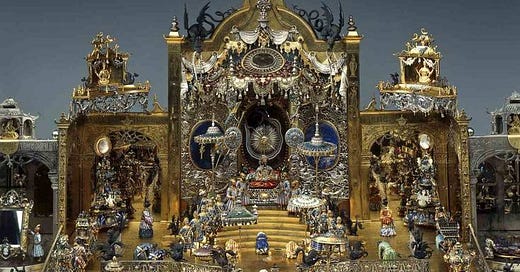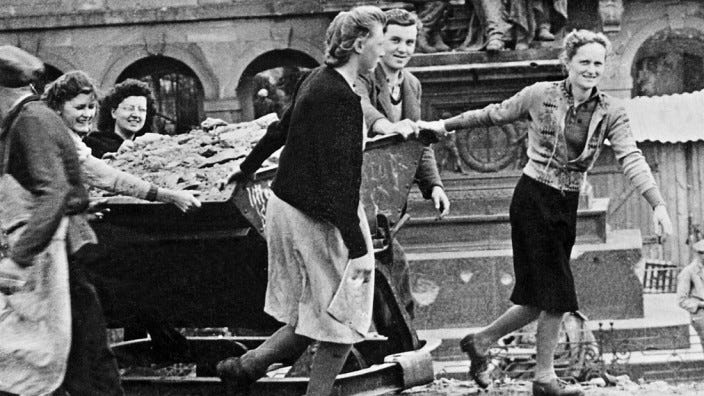Dear Global Jigsaw,
Sending this from the hospital, where I am waiting for blood results to determine if I can get chemo today, as scheduled. I caught a cold a few days ago and am not sure how that will impact my tolerance. I really don’t want any delay, because there are just 7 more weeks to go, and I don’t want any pause in the countdown. So, please keep your collective global-fingers crossed for me!
You are in for a treat with this week’s guest post by Ananya Vajpeyi, who modestly asked to be described as a scholar and writer based in New Delhi. I will link to her professional bio here, so you can know, just how modest.
Ananya has written a lyrical, meditation that is both personal, yet universal, about losing and finding love, destruction and resurrection, ranging widely from Kashmir and Delhi in India, to Dresden in Germany.
“Our lovers soothe us sometimes, but at other times they take a knife to our heart. Our countries shelter and nurture us until they bring us to our knees..,” she concludes.
Let us know what you think in the comments.
***
There was a tacit agreement equally binding on everyone that the true state of material and moral ruin in which the country found itself was not to be described.” -- W.G. Sebald, On the Natural History of Destruction.
Last summer, I visited several cities, some known to me, others for the first time. In many places, I felt the shadow of the past falling across the daylight of the present – Berlin, Prague, Leipzig, Halle – all formerly in the Eastern Bloc, ravaged by totalitarian regimes for the better part of the 20th century.
In other places – Venice and Istanbul – I felt torn between the ways in which I had known these cities in the past and how they were changing for me now, as I travelled with new companions. I saw for the first time the magnificent cathedral of St. Anthony in Padua; the forlorn castle of Miramare in Trieste on the shores of the cold Adriatic sea; the sunlit Aegean waters along the Turkish Riviera, which gave new meaning to the words ‘aquamarine’, ‘turquoise’, ‘wine dark.’ I couldn't decide if the world is boundlessly enchanted, or sunk so deep in the ocean of historical time that there is no hope of resurfacing.
In Dresden, I was with a man who was in flight from his past, as I was from mine. We came out blinking from long tunnels of darkness only to find one another in the light. Our grief dissolved into happiness in one another's arms. We walked every evening to the riverside, we wandered on the banks and bridges, we went to the museums, we sampled local beers and brews at sunset. We lay in the grass and watched the sky burn from blue to gold, the trees fade from green to shadow, the tide of pain that had washed over each of us subside and recede. I carried bags of fat shiny cherries and he carried an iPad filled with crystal bright photographs.
I can't say that we spoke particularly of deported Jews, the bombed-out city center, floods in the Elbe, the synagogues and concert halls rebuilt all around us. I can't say that the ruin wrought by the Nazis and their enemies three-quarters of a century ago marred those long summer evenings for us. A lover is a balm for all aches and a bulwark against all memories. I filed away my curiosity, my unease and my recollection about what had happened to Dresden in the Luftkrieg (Air War), and why things were the way they were.
Closer to the part of town where we were staying, there were graveyards all around us, quiet and wooded, tiny gardens in full bloom, tram tracks, tall grasses glowing mysteriously in the long summer light of the northern latitudes. People walked their dogs – some ridiculous and some dignified, as dogs are. Time was suspended in an eternal present without history and without future. We couldn't remember India, raw and rough, where we had both been badly hurt by those we loved, where we had suffered irreparable losses. If we couldn't recall our own past, how could we think of the past of others? Of that of peoples of a foreign country?
In the Residenzschloss (Royal Palace) we saw treasures and jewels from around the world. The showpiece in the Grünes Gewölbe (Green Vault) is a glittering, bejeweled representation of the court of the Mughal emperor Aurangzeb (r.1658-1707). It was made under the supervision of the royal jeweler Dinglinger in the first years of the 18th century and described as “the greatest work of European jewelry art”. We circled it in awe, took photographs, admired the breathtaking details. But it is so fantastically orientalist, it couldn't touch us emotionally at all – no pang of homesickness, no frisson of recognition arose within us.
The court of Aurangzeb in the Green Vault (https://skd-online-collection.skd.museum/Details/Index/118114)
One day, on a long walk, we came upon a hill from atop which we found ourselves looking down at Dresden. The hilltop commemorated the Trümmerfrauen, literally “Rubble Women” who had been enlisted to remove the debris of the aerial bombings after WWII. I looked them up after my German friend alluded to them – how they hauled and pushed huge pieces of broken stone in hand carts. How they retrieved clothing from the destroyed buildings and stitched rag dresses for themselves. How they carted rubble by day and worked as prostitutes by night. Insensible, we stood gazing out over the distance from a mountain of suffering.
The Trümmerfrauen. Credit: Süddeutsche Zeitung
We held hands and drifted slowly down the path wrapped up in one another's skin, bathed in the gentle perfume of love, unheeding of the historical evidence of a devastating war that paved the ground beneath our feet.
Who repaired the broken world? My sweet beloved, a scientist who mulled over equations and formulae as he whistled complicated tunes, or those laboring women, mothers, wives, sisters and daughters of Nazis, trying to put back into familiar shape a landscape scarred beyond recognition by unforgivable violence and its furious retribution? I thought of my Jewish friends whose grandparents or parents had survived the Holocaust and fled to England, America, Israel, France and South Africa. Could any love, any labor, ever repair the world for them?
I thought about my estranged partner, with whom I had spent two decades of my youth, haphazardly happy. He is a journalist from the most conflict-ridden part of the Indian subcontinent. I realized how all our affection for one another, our joy in being together, had in the end done little to assuage the horrors he had seen in his homeland. How I could never lay to rest the trauma he carries within him from a civil war that has gone on for thirty-five years, the entirety of his adult life.
Nor could he enter, beyond a point, into my bewilderment and despair as I lost my parents one after the other and watched my country, India, systematically take itself apart under the morally paralyzing spell of a majoritarian strongman, a purveyor of hatred like never before seen in India.
Sometimes, we cling in error to our personal losses, the slings and arrows of outrageous fortune by which we are struck. We forget that not only all around us, but even as near as the body asleep next to us on the bed, others too feel wronged. And they have reasons to think that what happened to them was worse than what they deserved. What can we offer by way of comfort?
Our lovers soothe us sometimes, but at other times they take a knife to our heart. Our countries shelter and nurture us until they bring us to our knees, digging in the dirt like the luckless women of Dresden, stitching together rags to hide their profound shame by day, and invite their relentless violation by night. We carry awhile the burden of our karma like stones; we rise from the ashes like jeweled birds; we fly away into the blue, on extended wings.
Ananya Vajpeyi
***
Thanks for reading. The Global Jigsaw is a labour of love. In an increasingly polarised world, it seeks to build bridges and emphasises our common humanity. Please consider becoming a paid subscriber to support this work. Thanks much, y hasta la proxima semana
Un abrazo,
Pallavi







So well written. Straight from the heart, the integrity,of both thought and motive,moves you.
On a separate note, trust your schedule of treatment continues uninterrupted, Pallavi. And thank you for sharing this marvellous piece!
" And they have reasons to think that what happened to them was worse than what they deserved. What can we offer by way of comfort?"
We are waves, of all sizes and shapes. In the end, however, we are the sea.
Injustice dissolves in this perspective of emptiness.
Which we all fill with good wishes for Pallavi.